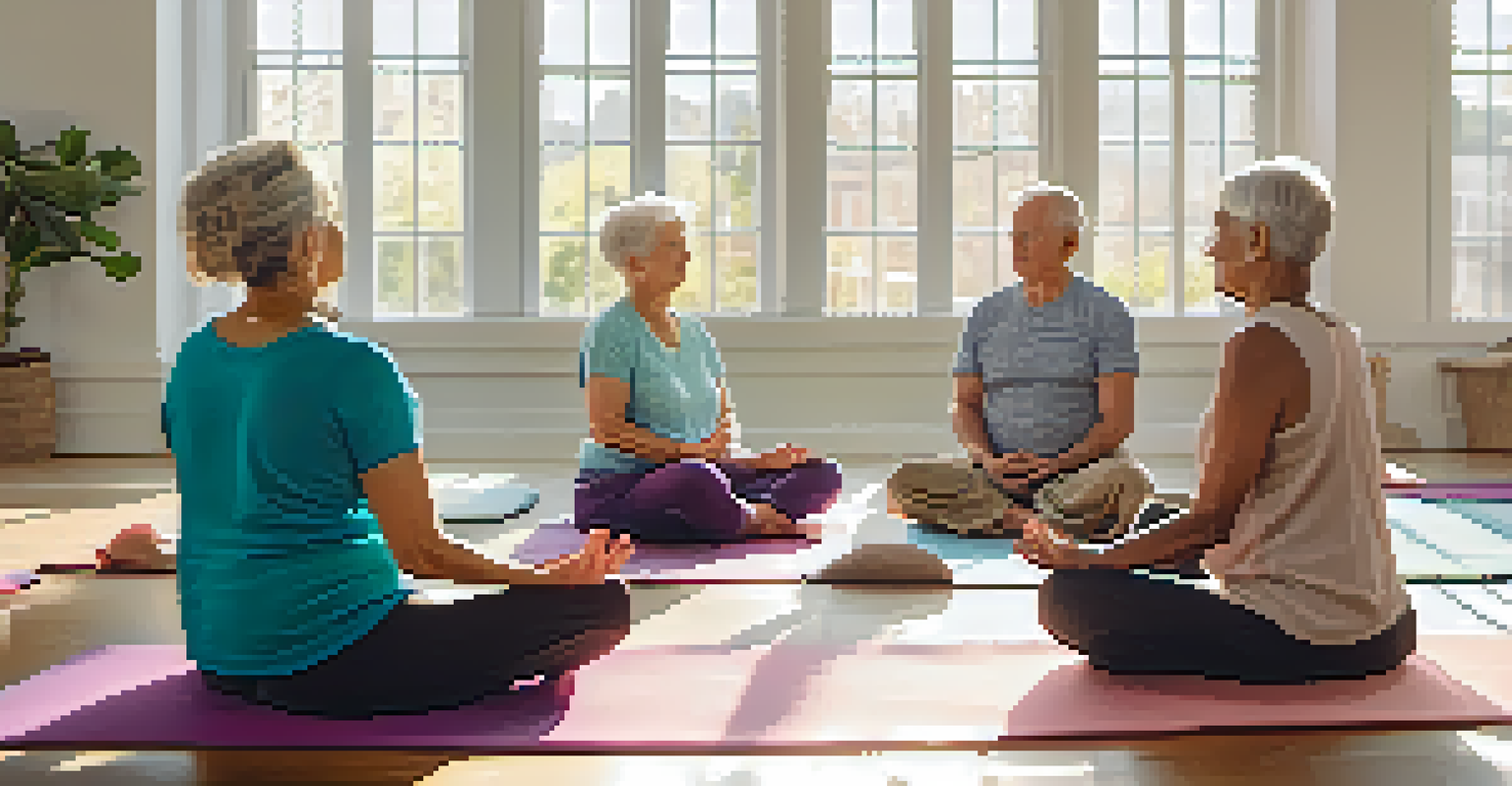How Spiritual Practices Enhance Well-Being in Aging Adults

Understanding Spirituality and Its Role in Aging
Spirituality encompasses a broad range of beliefs and practices that connect individuals to something greater than themselves. For many aging adults, this might involve traditional religious practices, meditation, or personal reflections on life. It’s important to recognize that spirituality is personal; it can vary widely from one person to another, yet it often serves as a source of comfort and meaning.
Spirituality is not a religion; it is a way of life that allows us to connect with our true selves and the universe.
As we age, the search for purpose becomes increasingly significant. Many older adults find that engaging in spiritual practices helps them explore their identities and values, leading to a deeper understanding of their lives. This exploration can foster resilience, allowing individuals to cope better with the challenges that come with aging.
Moreover, spirituality can provide a sense of community and belonging, which is crucial for emotional health. Group activities like prayer circles or meditation classes not only enhance personal growth but also encourage social connections, combating feelings of loneliness that can affect many seniors.
The Mental Health Benefits of Spiritual Practices
Engaging in spiritual practices has been linked to improved mental health outcomes for aging adults. Activities like mindfulness meditation can reduce anxiety and depression, promoting a more positive outlook on life. This shift in mindset is particularly valuable during the later stages of life when individuals may face significant losses and transitions.

Additionally, spiritual practices often encourage self-reflection and gratitude, both of which have been shown to enhance emotional well-being. For example, keeping a gratitude journal can help older adults focus on the positive aspects of their lives, fostering a sense of fulfillment. This simple act can make a substantial difference in how one perceives their daily experiences.
Spirituality Enhances Emotional Health
Engaging in spiritual practices fosters resilience, reduces anxiety, and promotes a positive outlook for aging adults.
Furthermore, spirituality can cultivate a sense of hope, which is essential for mental resilience. By connecting with their beliefs, older adults can find strength in adversity, leading to better coping strategies and overall mental health.
Physical Health: The Surprising Impact of Spirituality
While the mental health benefits are well-documented, spirituality can also have a positive impact on physical health. Research suggests that individuals who engage in regular spiritual practices may experience lower blood pressure and improved immune function. This connection between mind and body underscores the holistic nature of well-being.
The greatest discovery of my generation is that a human being can alter his life by altering his attitude.
Engaging in spiritual activities often encourages healthier lifestyle choices, such as regular exercise, balanced diets, and avoidance of harmful habits. For instance, many spiritual communities promote physical activities like yoga or tai chi, which not only enhance physical health but also integrate mindfulness and relaxation.
Moreover, the stress-reducing effects of spirituality can lead to better health outcomes. Lower stress levels can decrease inflammation and chronic pain, leading to a more active and fulfilling life for aging individuals.
Building Social Connections Through Spirituality
One of the most significant benefits of spiritual practices for aging adults is the sense of community they foster. Many spiritual traditions emphasize congregation and shared experiences, providing opportunities for older adults to connect with others who share similar beliefs. This sense of belonging can significantly reduce feelings of isolation and loneliness, which are prevalent among seniors.
Participating in group spiritual activities, such as worship services or meditation retreats, can create lasting friendships. These connections not only enrich individuals' lives but also provide a support network during challenging times. A shared spiritual journey can lead to deep, meaningful relationships that enhance overall well-being.
Community Reduces Loneliness
Participating in group spiritual activities builds social connections, significantly combating feelings of isolation among seniors.
Additionally, these social interactions can stimulate cognitive function and promote engagement in life. When older adults participate in discussions or collaborative practices, they keep their minds active and engaged, which is crucial for maintaining cognitive health.
Spirituality and Coping with Loss and Grief
Loss is an inevitable part of aging, whether it be the death of a loved one, loss of independence, or changes in health. Spiritual practices can provide essential support during these difficult times, offering comfort and a framework for understanding life’s challenges. Many find solace in rituals, prayers, or meditations that honor their grief and help them process their emotions.
Additionally, spirituality can help individuals find meaning in their loss. By reframing their experiences through a spiritual lens, aging adults can discover a sense of purpose even amid sorrow. This perspective can be transformative, allowing them to move forward with hope and resilience.
Moreover, sharing experiences of loss within a spiritual community can be incredibly healing. Group support fosters an environment where individuals can express their grief openly, helping them to feel less alone in their pain and allowing for collective healing.
Mindfulness and Its Role in Spiritual Well-Being
Mindfulness, a key component of many spiritual practices, involves being fully present in the moment without judgment. For aging adults, this practice can be particularly beneficial as it encourages a focus on the here and now, reducing anxiety about the future or regrets about the past. By cultivating mindfulness, individuals can enhance their overall quality of life.
Practicing mindfulness can also improve emotional regulation, allowing older adults to respond to challenges with greater calm and clarity. This skill can be invaluable in navigating the complexities of aging, from health issues to changing family dynamics. Mindfulness fosters a sense of peace that can permeate daily life.
Mindfulness Boosts Quality of Life
Practicing mindfulness helps older adults focus on the present, improving emotional regulation and overall well-being.
Furthermore, many mindfulness techniques are accessible and can be practiced independently or in groups. Simple practices like focused breathing or mindfulness meditation can be easily integrated into daily routines, providing a powerful tool for enhancing spiritual well-being.
Creating a Personal Spiritual Practice for Well-Being
Establishing a personal spiritual practice can greatly enhance well-being for aging adults. This practice can take many forms, whether it’s daily meditation, reading spiritual texts, or spending time in nature. The key is to find what resonates personally, allowing for a more meaningful connection to spirituality.
Starting small is often the best approach. For instance, setting aside just a few minutes each day for reflection or gratitude can yield significant benefits over time. As individuals become more comfortable with their practice, they may choose to expand it, exploring new methods or joining community groups.

Ultimately, the goal is to create a practice that feels authentic and enriching. By prioritizing spirituality, aging adults can cultivate a deeper sense of peace, purpose, and connection, enhancing their overall well-being in this important phase of life.